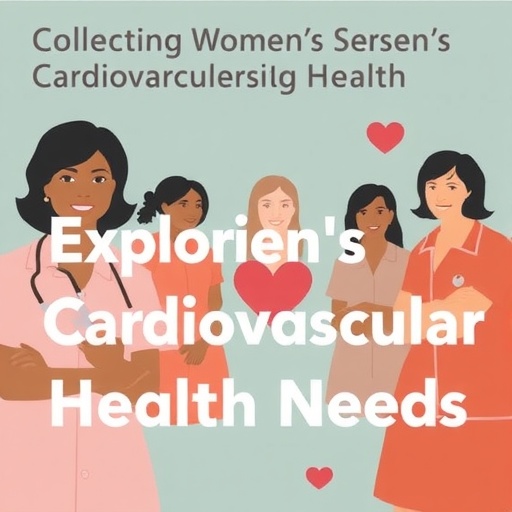Recent research has highlighted the critical need for a detailed examination of women’s cardiovascular health, particularly in regions like Georgia, United States. In a groundbreaking study, authors Vernon, McIndoe, Ryan, and colleagues conducted an extensive mixed-methods analysis to delve deeply into the cardiovascular health needs unique to women in this area. This study signifies a vital turning point in understanding how social, economic, and cultural factors intersect with women’s health, particularly in a space often dominated by research focused on men.
Cardiovascular disease remains one of the leading causes of morbidity and mortality among women globally. The traditional understanding of cardiovascular health has revolved around male-centric models, which often overlook the distinct physiological and psychosocial aspects that affect women. With the study conducted in Georgia, the researchers aimed to paint a more nuanced picture of cardiovascular health that is reflective of women’s needs and experiences within this community.
Utilizing a mixed-methods approach allowed the researchers to gather both quantitative and qualitative data. This methodology enhanced the richness of their findings, enabling them to draw upon statistical analyses while also capturing personal narratives and experiences of women living with or at risk for cardiovascular diseases. The quantitative data provided the backbone, showcasing prevalence rates and risk factors, while the qualitative data offered deeper insights into the life circumstances and challenges faced by these women.
The study’s findings revealed striking disparities in cardiovascular health awareness and access to care among women in Georgia. Many respondents reported a lack of knowledge regarding their risk factors and the symptoms of cardiovascular disease. This lack of awareness was compounded by socioeconomic barriers, including limited access to healthcare resources and educational programs tailored specifically for women. The research underscored the pressing need for targeted health education initiatives that address these gaps.
Moreover, the researchers uncovered that cultural norms and expectations significantly influenced women’s health-related behaviors. For instance, the emphasis on family caregiving often led women to prioritize the health of others over their own. This phenomenon not only increases their risk for cardiovascular diseases but also complicates their access to preventative care. By highlighting these cultural dimensions, the study draws attention to the importance of incorporating community-specific factors into health interventions.
In addition to uncovering barriers to care and knowledge, the study identified facilitators that encourage women to prioritize their cardiovascular health. Many respondents expressed the importance of support networks, including family and friends, which motivated them to engage in healthier lifestyle choices. Such findings are crucial for developing programs that leverage existing social support systems to promote cardiovascular health among women.
The researchers also noted the importance of intersectionality in understanding women’s cardiovascular health. Factors such as race, socioeconomic status, and education level contributed to differing health outcomes. For instance, Hispanic and African American women reported higher levels of stress related to financial insecurity, which exacerbated their health risks. This insight calls for a more tailored approach to healthcare that recognizes the diverse experiences of women based on their backgrounds.
One of the most compelling aspects of the study is its emphasis on the importance of preventive care. Many women expressed a desire for more resources focused on prevention rather than just treatment. This desire aligns with public health strategies advocating for earlier intervention and education around cardiovascular health. By fostering a culture of prevention, it is possible to mitigate the long-term impacts of cardiovascular diseases on women’s health.
Despite the valuable insights provided by this study, the researchers also acknowledged several limitations. The focus on a singular geographic area may restrict the generalizability of their findings. More research is needed to explore the cardiovascular health needs of women across different regions and demographics. However, this study serves as a vital starting point for a deeper exploration of gendered health disparities.
The implications of this research extend well beyond Georgia and resonate on a national scale. Public health policymakers are called to action to integrate findings from such studies into broader cardiovascular health initiatives. By crafting policies that recognize the unique experiences of women, it may be possible to design more effective interventions that can save lives.
A comprehensive mixed-methods analysis such as this serves as a roadmap for future research endeavors. It highlights the necessity of viewing women’s health through a multifaceted lens that considers biological, psychological, and social influences. Only by adopting this holistic perspective can researchers and healthcare providers hope to close the existing gaps in women’s cardiovascular health knowledge and care.
In summary, the work by Vernon, McIndoe, Ryan, and their team represents a pivotal moment in the study of women’s cardiovascular health. Their findings call for a re-evaluation of health strategies surrounding cardiovascular disease, focusing on education, prevention, and personalized care. Moving forward, it will be essential to harness the insights gained from this research to implement actionable changes that empower women to take charge of their cardiovascular health.
Ultimately, this study advocates for a paradigm shift in how we understand and address women’s health issues. By integrating women’s voices and experiences into the fabric of cardiovascular health research, we can ensure that all women receive the comprehensive care they deserve.
In essence, cardiovascular health for women is not just a medical issue; it is a societal concern that demands our immediate attention. The urgency to weave together health equity and personal empowerment in women’s health care is now more pressing than ever, and it starts with understanding and addressing the unique needs of women in communities like Georgia.
Subject of Research: Women’s Cardiovascular Health Needs in Georgia, United States
Article Title: A comprehensive mixed-methods analysis of women’s cardiovascular health needs in Georgia, United States
Article References: Vernon, M., McIndoe, B., Ryan, M.J. et al. A comprehensive mixed-methods analysis of women’s cardiovascular health needs in Georgia, United States. Biol Sex Differ 16, 62 (2025). https://doi.org/10.1186/s13293-025-00740-5
Image Credits: AI Generated
DOI: 10.1186/s13293-025-00740-5
Keywords: Women’s Health, Cardiovascular Disease, Mixed-Methods Research, Health Disparities, Public Health.




